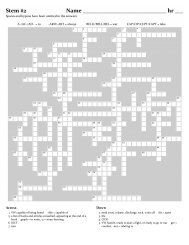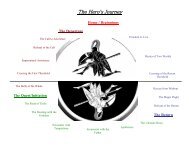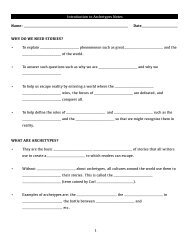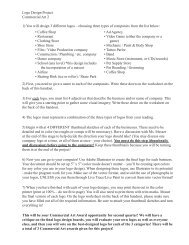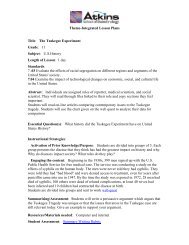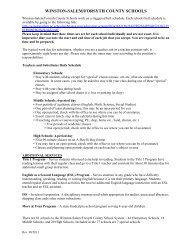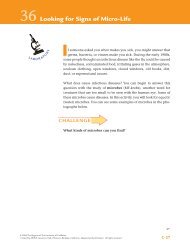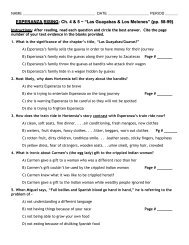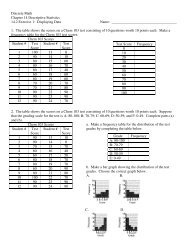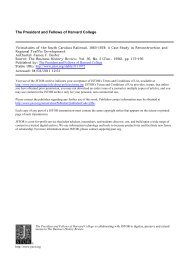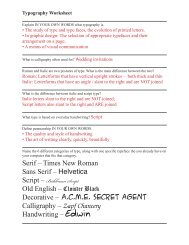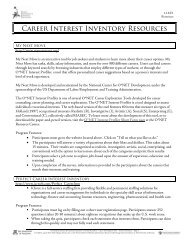World War One
World War One
World War One
- No tags were found...
Create successful ePaper yourself
Turn your PDF publications into a flip-book with our unique Google optimized e-Paper software.
The war dramatically expanded government powers, created new government ministries and powers, new taxes, and new laws wereenacted. As the war dragged on, conditions worsened throughout Europe, with more government centralization (control), economicregimentation, and manipulation of public opinion (propaganda). <strong>War</strong>time governments expanded their economies. Free marketcapitalism was put aside as the government stepped in to control price, wage, rent, rationing of food supplies and materials, regulationof imports/exports, and the nationalization of transport systems and industries. In total war, it became hard to tell the differencebetween life for a soldier and a civilian.As the war dragged on and conditions worsened, patriotic enthusiasm was replaced with dissatisfaction. Civilian morale was beginningto crack under the pressure of total war. As the powers of the government expanded, the police also gained more power to stifleinternal dissent. Britain passed the Defense of the Realm Act (DORA) which allowed dissenters to be arrested as traitors. DORAcensored newspapers, deleted objectionable material, and suspend the newspaper publication.France originally allowed public opposition to the war but by 1917 also cracked down, as the dissent weakened the French will to fight.Georges Clemenceau (1941-1929) became Prime Minister near the end of 1917 and cracked down. Basic civil liberties weresuppressed for the rest of the war. Asking for peace could get you imprisoned for 2 years as treason.The <strong>War</strong> Ends!Bulgaria was the first of the Central Powers to surrender. They signed an armistice Sept. 29, 1918.The Allied forces refused to negotiate with the German Kaiser and insisted on dealing with representatives of the German peopleinstead. Sept. 29, 1918 Germany’s top two generals Paul von Hindenburg and Erich Ludendorff pressured Kaiser Wilhelm II toestablish a constitutional monarchy. The Kaiser went into hiding in a Belgian resort but would not officially step down.His cousin Prince Max von Baden was named Chancellor and assumed leadership of the country. Max replaced the authoritariansystem of Bismarck with a parliamentary system. Prince Max immediately began to ask the Allies about an armistice--but he was notready to surrender unconditionally. He believed that he could negotiate favorable terms for Germany even though they had sufferedcontinuous losses on the battlefield. Germany had surrendered but had not been defeated. Germany was winning in much of Franceand Belgium when peace was established, and Germany won against Russia. Germany expected the terms of peace to be acceptableto everyone and to follow Wilson’s 14 Points.Wilson stated he would not begin to discuss an armistice until all German and Austrian soldiers left France, Belgium, and Serbia. TheGerman government agreed and withdrew its forces from France and Belgium, yet fighting on the Western front continued untilGermany announced it would cease all submarine warfare.Nov. 1918, the situation in Germany deteriorated from unstable to chaotic. German military leaders realized their attempt to breakthrough the Western front and capture Paris would not succeed. Germany was exhausted. Hunger, economic shortages, andfrustration at the policies of the German Kaiser led to riots in the streets and mutinies in the military-- especially in the Navy. Germanybroke out in revolution from Nov. 1918-August 1919.Meanwhile, Prince Max was ineffective in negotiating favorable terms. Wilhelm (still in hiding) would notofficially abdicate the throne so Max went public and announced the Kaiser was abdicating the throne. ThenPrince Max resigned.Germany had a Bolshevik party (like Russia) and a left-wing political group--the Social Democratic Party ofGermany (SPD) but neither one of these groups could get along. All of this disagreement weakened the leftwing socialist-communists parties so a democratic government took power—the Weimar Republic (Nov. 1918).This government was a republic (like America) with a new constitution and parliament (like our Congress).28



